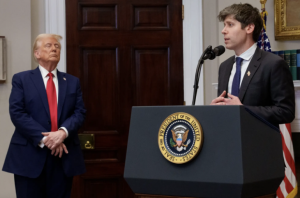Arcela Nuñez-Alvarez moves towards building bridges throughout the community
Faculty Spotlight
September 30, 2015
Arcela Nuñez-Alvarez goes above and beyond in everything she does both on and off campus. As Research Director of the National Latino Research Center and a faculty member in the Anthropology Department, she works with and impacts people from various backgrounds on a daily basis.
Immigrating from Mexico to California when she was 12, the CSUSM alumnus grew up in San Marcos where she attended middle and high school. She continued her higher education and received her Bachelor of Arts in Social Sciences degree in preparation to become a secondary school teacher.
Even though she studied to become a teacher, Alvarez’s path changed drastically when she moved away to pursue her master’s and PhD at the University of Minnesota, where she studied the history of Latin America and the politics between Mexico and the U.S.
One thing that did not change, however, was her goal to come back to San Marcos.
“I always wanted to stay in Southern California, and specifically San Diego. I love it here. This is home for me,” said Alvarez.
Alvarez has been the Research Director at the NLRC for 12 years and is responsible for managing research projects at the center. This includes analyzing data collections and meeting with community partners. She is also in charge of finding resources to fund the studies, writing grants and applying for funding so that research proposals can transition to action.
“The [NLCR] helps to [communicate what] the Latino community is, both locally and nationally,” said Alvarez.
The center helps to build a bridge between the university and Latino families, and offers resources for people in the community.
Alvarez is currently overseeing multiple projects at the center, one of which is titled “Cultivando Salud” (cultivating health). It is one of the most successful studies that the center has done so far.
“‘Cultivando Salud’ focuses on ways to address issues of obesity and diabetes among the Latino community,” said Alvarez.
Through social classes in the community that they have led, the research team has observed that lack of access to services contributes to health problems that are prevalent amongst the Latino community.
Alvarez’s team at the center is now using their funding to provide these resources to the community and are already seeing a huge improvement. Under her direction and supervision, our students on campus worked with Latino community members and made a recipe book filled with stories and recipes from a variety of families in the area.
This project was successful because of the applied research. It also allowed for engagement of university students by giving them research experience and helped raise their cultural awareness.
Another successful project that Alvarez has been part of is the “Universidad Popular” (people’s university), which spotlights the education of the Latino community and aims to teach parents, youth and grandparents. This project has become a course in the community that teaches people how to prepare for college and further their education.
“There is a lot of misunderstanding with college requirements and for many of the youth, they are the first to go to college,” said Alvarez.
Due to the incredible impact that Alvarez and her team are making in our community, more and more lives are being touched and changed each day with the knowledge that is being shared.
Focusing on the future, Alvarez is excited for what is to come for the NLRC’s new study that is beginning in October.
“The purpose of this new study [is to] look at the issues of political participation among Latinos,” said Alvarez.
This study is also expected to investigate the reason behind the large gap in the political representation of the Latino community despite the large population.
Alvarez’s role is important as an educator to Latinos in the community.
“Education is the key to success in helping the Latino community.”






